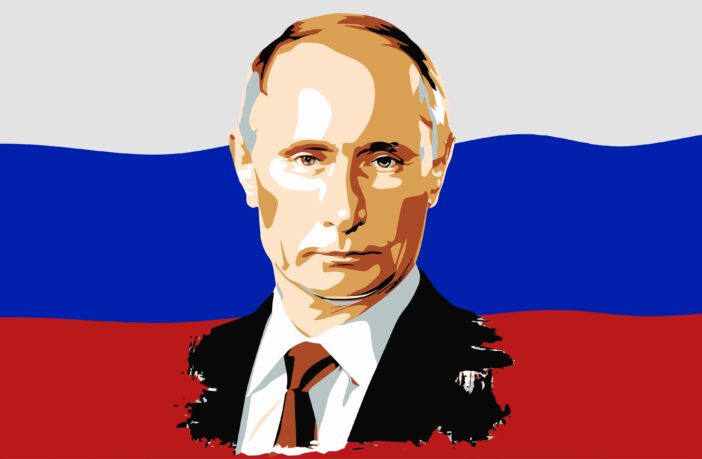This Friday Russia goes to the polls in a general election predicted to reinstate Vladimir Putin as leader, again. Behind the scenes will be a tried-and-tested toolkit to ensure his victory, according to Open University academic Dr Precious Chatterje-Doody – Senior Lecturer in Politics and International Studies, who specialises in Russian information manipulation.
Technically, the Russian President is only allowed to serve two consecutive terms of office and Putin should have been ineligible to stand for election this year.
But it’s easy to comply with the rules if you simply re-write them. Over his tenure, Putin has extended Presidential terms from four to six years, job-swapped with the Prime Minister, and passed Constitutional amendments that ‘zeroed’ his terms to start counting afresh.
Which is why we see him on the ballot papers again, alongside so-called ‘opposition’ candidates that in reality prop up the system.
Putin is already set up to win, because there is a wide range of manipulation techniques that go into the average Russian presidential election.
This includes short-term manipulation of the election itself involving bussing in state employees to vote for the incumbent en masse and also long-term manipulation of politics and media, so that there aren’t any obvious alternatives.
The Kremlin has form. It has perfected its strategy:
- First, domesticate your opposition parties so that any really significant opponents are dead, jailed or in exile and the ones that remain know what’s expected of them and will not rock the boat too much.
- Second, manipulate the domestic media ecology so that the incumbent can campaign without campaigning. Here’s how: have state-controlled television report the ‘good deeds’ they do as part of their job, but keep Putin’s face away from more controversial policies. Then ensure other candidates get little, if any, airtime.
- Third, if any interesting candidates appear too close to the actual election, then use administrative trickery to keep them off the ballot. The Central Election Commission can be relied upon to find so-called ‘errors’ in the complex paperwork or to disallow enough of the signatures that have been gathered from members of the public so the candidate no longer meets the required threshold for support.
Alternatively, perhaps a closed case from the past will suddenly result in an unexpected conviction that makes them ineligible to stand. - Finally, if all of these tactics don’t give the preferred impression, then massage the votes themselves. It wouldn’t be a Russian presidential election without videos of ballot stuffing floating around social media.
This year, electronic voting will be rolled out across a range of regions and the election will take place over several days. This will supposedly make voting easier for residents in remote regions, and the annexed regions of Ukraine.
It also gives the authorities the edge in massaging the results as electronic votes are easier to manipulate and the early results give them an indication of what trends they might need to account for in the votes cast.
Navalny death unlikely to change result
The death of opposition Russian politician Alexei Navalny last month while in an arctic circle prison 1,200 miles from Moscow is unlikely to have much effect on the result.
The prevailing mood since is probably more sadness and despair than anger or galvanisation as it’s the latest in a long line of blows to the Russian opposition.
The Navalny campaign, and lots of other more ‘genuine’ opposition figures, had thrown their support behind Boris Nadezhdin of the Civic Initiative Party, who had started to get a surprising level of visible support in the run-up to the election when he was running on an overt anti-war platform.
But the electoral commission found a problem with the signatures he’d gathered for his candidacy and refused to register him.
Appearance of choice
If he had remained on the ballot, we might have seen a surge in support of him (in second place, of course) as a protest vote from people angry about Navalny’s death. Now there’s nowhere for their votes to go.
All the remaining candidates on the ballot are from what we call the ‘systemic opposition’: opposition parties in name, but in function they support the current leadership by giving the appearance of a choice.
They absorb some voters’ frustrations and trial policy ideas that the government isn’t sure it wants to be associated with. At the same time, they keep their criticism within permitted limits – none of the other presidential candidates are against the war on Ukraine, and some have no real policies at all.
It’s not all good for the Kremlin
And about the war. The general mood of public opinion remains difficult to reliably measure as expressing any negative opinion of the war has essentially been criminalised.
There is a generalised sadness and despair around Navalny’s death and a total disinterest in the election itself, which is no surprise given the result is pre-determined.
But this is not all good news for the Kremlin – it relies on a fairly high turnout to legitimise the ruling regime and usually manipulates turnout in a variety of ways to achieve this aim.
This year, it will be concerned about the potential for violent clashes at the polls. Navalny’s FBK (Anti-Corruption Foundation) has encouraged people to turn out en masse at the polls on Sunday, 17 March at noon as a form of protest but otherwise, mass demonstrations of any kind are highly restricted.
Discrediting the Navalny camp
The Kremlin is still working overtime to discredit the Navalny camp. Internationally, Russian media operations have been promoting a variety of conspiracy theories about his death, and there are extensive attempts to discredit Yuliya Navalnaya, who has said she’d continue her husband’s work.
Waves of conspiracy theories are released to reduce the plausibility of any real information emerging, and make people apathetic about the truth. A similar ploy was used after the poisoning of the Skripals in Salisbury in 2018, also just before a presidential election.
All this while the Kremlin tries to manage expectations around its ongoing involvement in the war in Ukraine and ramps up the military-patriotic education of children and young people.
Tragically, children who’ve been taken from annexed regions of Ukraine are increasingly on the receiving end of this, being taught that Donbas is Russia and trained in the military skills they will need if mobilised into Russia’s war.
There are many cogs in a machine like Putin’s, and predictable elections like this are just one of them.
Picture credit: Pixabay



